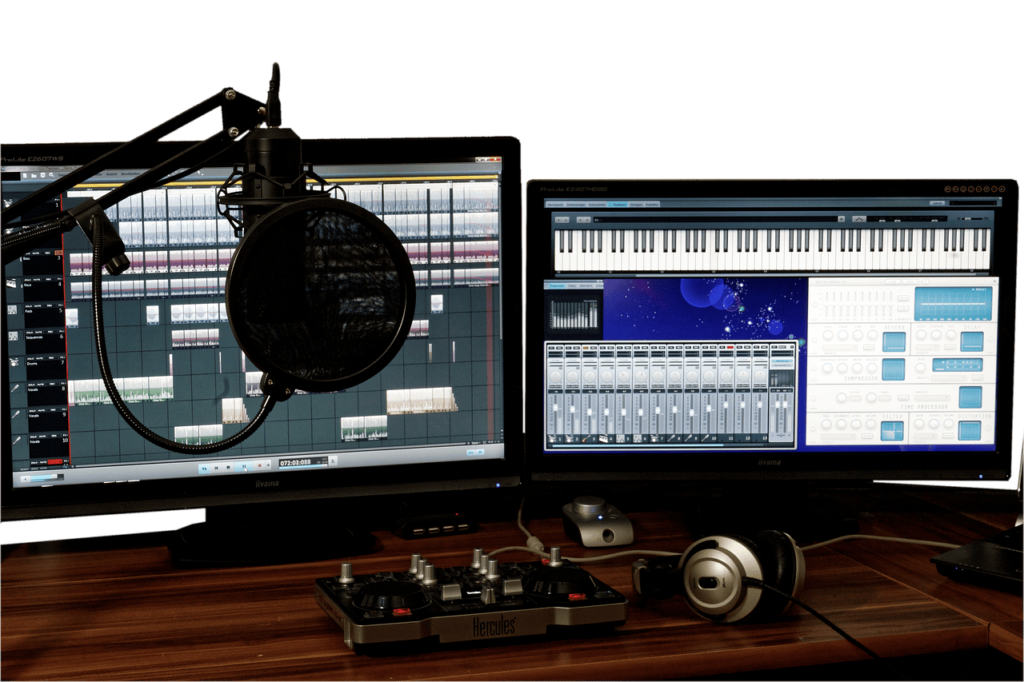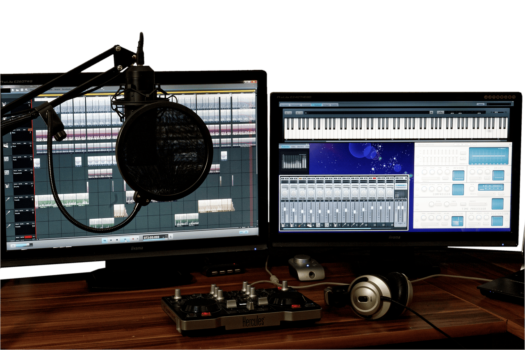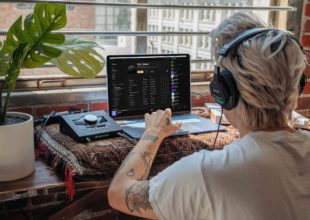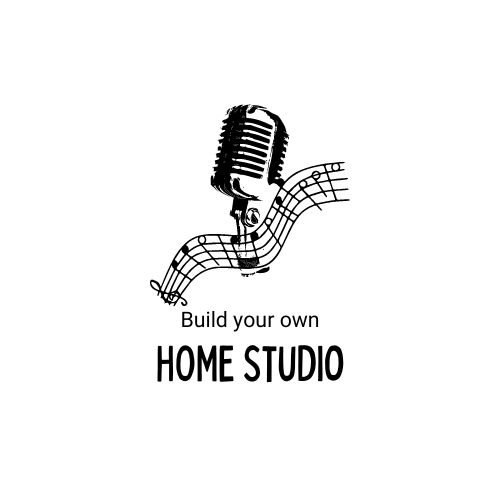There’s something alluring about the idea of recording professional-quality songs in the comfort of one’s own home. After all, who doesn’t want to save money and avoid long commutes to the studio? Especially when you are a beginner, and you do not know how your music making career will pan out. Building your own home recording studio makes perfect sense in 2023 as technology is mass produced and affordable.

But is it possible to record studio quality songs at home? The answer is yes…with a few caveats. In this article, I’ll share some tips on how to get the best sound quality from a home studio setup.
Table of Contents
Overview of Home Studio Recording
There’s no doubt that professional studios have a huge advantage when it comes to sound quality. They have experience and much better (but expensive) gear. Unfortunately, most of us don’t have the liberty to spend on pro studios. Hence, we look for cheaper solutions. But there is good news. Low budget doesn’t mean you cannot get great results from home studio recording. Home studio recording using cheaper gear is not very far behind pro studios. Case in point – Billie Eilish’s “Ocean Eyes” song was recorded in a bedroom studio using only stock plugins. It is one of her most famous songs. Amazing, isn’t it?
In fact, with the right process and practice, you can come surprisingly close to the sound quality of a professional studio. The key is to set realistic expectations from your home studio setup. Don’t expect it to perform miracles—you’ll need to work within its limitations. But by understanding what those limitations are and how to work around them, you can produce quality recordings from your home studio.
Why is home studios are so affordable these days?
Setting up your own home studio is a lot cheaper than renting studio time in a professional recording facility. You can also work at your own pace, without having to worry about the clock ticking or other musicians waiting for their turn in the studio. There are cheaper pro studios which charge minimum Rs. 1,000 to 1,500 per hour, depending on demand. It takes minimum 6 to 8 hours for a beginner to record a song in pro studios depending on the complexity and length of song. So that’s about Rs. 6000 to 12,000.
On the other hand, buying your own minimalistic studio equipment could cost you even less than Rs. 20,000! ifProvided you already have a computer or laptop. And of course, you can record whenever you want, without having to worry about traffic or booking studio time. Just make sure you set realistic expectations from your home studio setup. It’s not going to sound as good as a professional studio, but with some practice and careful calibration you can get great results.
Home studios perfectly make sense for musicians, particularly beginner musicians. And even the pros understood its importance during the pandemic. Anyways, so let us look at why home studios are so cheap these days? Here are the reasons –
Most of the recordings these days is done ‘in the box’
Software technology is so advanced these days that analog gear is not frequently required in most cases. You can achieve all the functions that outboard compressors and reverbs used to give. Thus the phrase ‘In the box’ means – in the computer. In fact, you will not have much use for mixers or mixing desk unless you want to record an ensemble of many musicians or if you do lot of live projects. This brings the overall cost down significantly.
Number of inputs required are less
In most cases, home studio musicians record one vocal or instrument at a time and then record other instruments one by one on top of the mix in different tracks. Later, the all the clips are mixed together in a cohesive song or musical piece. Therefore, only one or two inputs and mic preamps are enough for home recording. This proves to be far less costlier than purchasing a lac rupee audio interface with 16 or more inputs – a must have in professional studios.
Competition between manufacturers
Due to mass manufacturing and competition between manufacturers, there is often a price war resulting in heavy discounts. This also significantly brings down cost of microphones, interfaces and other equipment.
Limitations of Home Studio Recording
There are limitations to what you can achieve with a home studio, and it’s important to be aware of these from the outset. You’re not going to get the same sound quality as you would in a professional studio, for example. But this doesn’t mean that home studio recording is useless – it just means that you need to set realistic expectations and work within its limitations. For example, you might need to use fewer tracks when recording, or consider using plugins to improve the sound quality.
The key is to find the limitations of your setup and work on improving these. With a bit of practice and perseverance, you can produce quality recordings in your home studio.
Best Practices to Enhance Sound Quality in a Home Studio
When it comes to getting the best possible results from home studio recording, there are a few best practices that you can follow. One of them is learning how to use and place the microphone before a vocalist or instrument.
Another important tip is to use acoustic treatment and diffusers on the walls of the recording space. Acoustic treatment helps absorb sound waves and will prevent any unwanted echoes from interfering with your recordings. Additionally, diffusers will disperse any reflected sounds and create an even sound in the room.
Finally, make sure all of your equipment is of consistent quality. This includes everything from your audio interface, your speakers and monitors. Having everything properly connected and of good quality will ensure that you get clean and consistent recordings every time.
Equipment Needed for Home Recording
When it comes to the equipment needed for home recording, the most important thing to consider is a good quality mic and audio interface. An audio interface acts like the bridge between your computer and physical instruments or microphones. This means that whatever you record from instruments or vocals, should pass through this piece of equipment before reaching your computer and recording software. While there are budget-friendly options available, spending more on higher quality mics and audio interfaces can be worth it in the long run, as you will have more control over the sound.
Aside from an audio interface, you will also need a good set of studio monitors and headphones for mixing your tracks. If you have a grossly untreated room or you don’t have budget for studio monitors, it is better to go for headphone mixing till you can save up and afford good quality monitors.
Tips for Optimizing a Home Recording Set Up
It’s no secret that setting up a home studio can be an intimidating task. So, let me share some tips from my own experience that have helped me get amazing sound quality from my recordings. The first step is to find the right space for the set up. You’ll want to look for a room with minimal background noise and no echoing or reverberating sounds. Once you’ve found the perfect spot, you can start investing in sound absorption materials such as blankets, curtains and acoustic treatment products like bass traps.
Also make sure to get a good microphone and audio interface setup to record your tracks in high quality. Buy good quality microphones and check out their frequency curves to pick the one that will fit best with your voice or instrument of choice. And lastly, I’d recommend getting a decent pair of studio headphones that provide a balanced frequency response so you can accurately mix and master your songs to perfection!
Conclusion
The home studio setup is a great way to get started with music production. With a bit of patience and practice, you can get great results. Remember to experiment and find what works best for you, and don’t be afraid to ask for help from the online community.
So, is it possible to record studio quality songs at home? I would say, why not?



